Offered by the Department of Plant Sciences
Agricultural microbiology is a sector of science that deals with plant-associated microbes and their roles in agriculture-related industries. This branch of science explores microbes, their processes and the relationships with plants with the intention of exploiting them to enhance productivity in agricultural industries while safeguarding the environment. The constant spread and evolution of agricultural pathogens provide a continually renewed source of challenges to productivity and food safety, while numerous benefits are derived from many microorganisms associated with, or introduced into, cropping systems, food, and food-related industries. Knowledge of microbial pathogens will lead to tools for surveillance and disease prevention. Beneficial microbes may find uses in agriculture as biofertilizers, phytostimulators, bioherbicides, biopesticides, bioremediators, etc. Thus, Master of Science programme in Agricultural Microbiology intends to provide an in-depth knowledge of plant-associated microbes and the sustainable use of microorganisms as a valuable tool in agriculture
Testimonial: MSc in Agricultural Microbiology
A Comprehensive and Supportive Learning Experience

Buddhika Dilshan
I’m Buddhika Dilshan, currently working as a Research coordinator for a research center at a government University. As a student of the MSc in Agricultural Microbiology offered by the department of plant sciences, UOC I’m delighted to share my experience and provide a review of this outstanding program. With its academic excellence, comprehensive curriculum, and supportive faculty, it has proven to be an invaluable stepping stone in my intellectual and professional growth.
It’s a well-structured program, it combines coursework, practical experiences and industrial experiences through resource persons within and outside of the faculty. One of the program’s strengths lies in its exceptional faculty members. They are not just experts in their respective fields but also passionate educators who provides an engaging learning atmosphere. Their dedication to delivering quality education is evident in their thorough explanations and discussions. Not just one way communication, but two-way communication, group activities just make the program more entertaining, interacting with different individuals from different backgrounds. Carefully designed curriculum strikes a perfect balance between theoretical knowledge and practical application. Designed to provide a comprehensive understanding of the subject matter, ensuring students acquire the necessary skills and expertise demanded by the industry. So, I would highly recommend this program to anyone who’s interested!
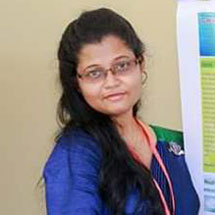
Y. M. Shashika M.Yapa
I was aware that I would want to pursue a master’s degree after receiving my bachelor’s degree, but I never thought I’d be able to accomplish both. At UoC I am fortunate to have a fantastic network of coworkers and professors who encourage me. Without their ongoing help, I would not be the one I am today. I am beyond grateful that my time at UoC has led me on a journey I never would have imagined.
In all honest, the MSc in Agricultural Microbiology program has given students a fantastic opportunity to study a variety of fields in the microbiology world such as pathology, food microbiology, soil microbiology, plant quarantine and legislations, bioinformatics as well as entrepreneurship and etc. education. I have had several opportunities to get involved in course modules, field visits, and enhance my abilities through practical and other challenging courses.
Finally, what has made this program such a worthwhile experience and what has motivated me to achieve are the people I have met there, both lecturers and peers.
Y. M. Shashika M.Yapa, Temporary Instructor , Faculty of Technology , University of Colombo
MSc Agricultural Microbiology Review

Sumudu Handunwala
When I was searching for M.Sc. programs after my bachelors which are on par with my future goals and my academic background, I got to know about Agricultural Microbiology M.Sc programme at UoC. Although I was very confident on the course content at first glance, I was in a dilemma whether the course will flow smoothly. The dilemma didn’t last long. Starting from the first day, in each theory and practical session, we could gather a lot of industrial and practical inputs. The course content was specifically tailored to address the current agricultural trends.
Most importantly, including bioinformatics as one of the courses is really admirable which will pave the path for valuable future academic careers. The field visits and the other outdoor programs were interesting and fun-filled. I am so much grateful to the academic staff for designing such a significant and futuristic course which covers almost all the agricultural microbiology aspects and beyond. Further, it is very tough to follow a M.Sc. while engaging in a full-time job. However, the flexibility of the academic staff should be highly appreciated in this regard. Last but not least, all the courses including plant inspection & quarantine, and Entrepreneurship aided me a lot to match the agricultural business with an industrial perspective.
Highly recommended this M. Sc Programme for anyone interested.
Executive – Strategic Support (Current student), Agstar PLC

Asiri Perera
What first attracted me to the Master of Science in Agricultural Microbiology program at University of Colombo was the diverse applications of this field. Whether you wish to start an agribusiness or become a researcher solving the problems of global food security, understanding the complex relationships between plants and microbes is essential. Serving as a biology teacher for several years, it is assumed that I would be knowledgeable in all fields bioscience-related.
However, one amazing thing about science is that it is a journey where there is always something new to discover! My undergraduate studies were in Biotechnology, and, while microbiology and plant sciences were covered as units of the course which piqued my interest, I had so much more to understand in these fields.
The Master of Science in Agricultural Microbiology program starts with the basics of microbiology and plant-microbe interactions, many concepts of which were novel to me. Further topics are taught after consolidating these foundational areas. The syllabus is very comprehensive and well-designed covering the multitude of roles microbes play in agriculture: from understanding plant disease and disease management to learning about symbiotic microbes and how to harness beneficial microbes in agriculture. The program also includes practicals to get hands-on exposure and field trips to introduce students to the ways that theory is applied in industry. I was also pleased that the syllabus further covered areas such as bioinformatics, entrepreneurship and plant quarantine which I found exciting and added value to the program outcomes.
The faculty are extremely knowledgeable in their fields and have been very helpful to the students in explaining key concepts and are generally excited to share their knowledge. I have also found that the faculty and other staff have been friendly, approachable and harbor a culture of collaborative learning. In my fellow students, I found a genuine group of people who are keen to learn new things while having fun and are also ready to help each other.
I wish the best for this program and hope that it continues to grow from strength to strength.
Asiri Perera, Lecturer and Program Coordinator, Universal College Lanka.
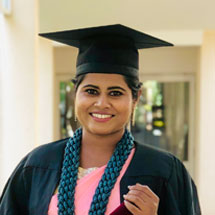
Thilini Dinushka
As a current student pursuing the MSc in Agricultural Microbiology, offered by the Department of Plant Sciences, UoC, I am delighted to share my experience and express my utmost satisfaction with the program. This short testimonial will highlight some key aspects that make this program truly outstanding.
First and foremost, the course content of the MSc in Agricultural Microbiology is meticulously structured, covering a vast range of topics in microbiology. From foundational concepts to cutting-edge research, the curriculum leaves no gaps in understanding. The comprehensive nature of the course has provided me with a solid foundation and a holistic view of the field. I feel well-prepared to tackle the challenges and opportunities that lie ahead in agricultural microbiology.
The support and flexibility offered by the staff have been exceptional. The faculty members are not only experts in their respective fields but also approachable and supportive mentors. They are always willing to provide guidance, clarification, and advice, both inside and outside the classroom. This level of support has significantly contributed to my growth as a student and has fostered a conducive learning environment.
One of the key advantages of this program is its commitment to on-time completion of the scheduled program. The curriculum is thoughtfully designed, allowing students to progress through the coursework in a timely manner. This ensures that I can graduate within the anticipated timeframe without compromising the quality of my education. The program’s efficient planning and adherence to deadlines have instilled in me a sense of discipline and have prepared me to meet future professional commitments.
Furthermore, the program offers practical opportunities to apply theoretical knowledge. The inclusion of laboratory sessions, research projects, and fieldwork has been invaluable in developing my practical skills and enhancing my understanding of real-world applications. These hands-on experiences have not only reinforced my theoretical understanding but have also prepared me for the challenges I may encounter in my future career.
In summary, the MSc in Agricultural Microbiology has exceeded my expectations in every aspect. The well-structured course content, the supportive and flexible staff, and the emphasis on timely program completion have made it a truly exceptional choice for anyone interested in microbiology and its relevance in agriculture. I am immensely grateful for the knowledge and skills I have gained through this program, and I wholeheartedly recommend it to anyone seeking a rewarding educational experience in the field of agricultural microbiology.
Thilini Dinushka (Current student), Graduate officer, SLSI
MSc Agricultural Microbiology Student Review

Viduranga Bokanda
I am writing this testimonial to express my utmost satisfaction and gratitude for being a current student of the MSc Agricultural Microbiology course at the University of Colombo. This program has truly exceeded my expectations and has been a transformative journey for me both personally and professionally.
First of all, I applied for the course, as microbiology is a kind of very interesting and a joyful subject of my preference. But, even exceeding my expectations the program has provided me with a solid foundation in the field of microbiology, equipping me with a deep understanding of the intricate relationship between microorganisms and agriculture. The faculty members are highly knowledgeable, experienced, and passionate about their subjects, and their dedication to teaching and mentorship has been instrumental in my academic growth. Also, one of the key factors I satisfied the most about the course is the timeliness and the proper arrangement of the program. Even during the Covid pandemic and many hurdles occurred, the staff always thought from the student’s point of view and did everything in their capacity to finish up the program on time.
Lastly, being a student at the University of Colombo has also offered me numerous experiences related to real world applications of the theoretical knowledge we gather during our studies. Through the field visits arranged by the university and through special lecture sessions by various resource persons I have had the privilege to interact with renowned scientists, researchers, professionals and entrepreneurs in the field of agricultural microbiology as well as plant tissue culture.
In conclusion, I can confidently say that the MSc Agricultural Microbiology course at the University of Colombo has been an enriching and rewarding experience for me. The quality of education, emphasis on practical learning, research opportunities, supportive environment, and field work have truly set this program apart. I am confident that the knowledge and skills I have gained during my time here will immensely benefit me in my future endeavors and I would highly recommend the MSc Agricultural Microbiology course at the University of Colombo to any aspiring student looking to pursue a career in this dynamic and vital field. It is a decision that you will never regret.
Sincerely,
Viduranga Bokanda, Senior Executive – Quality Assurance, Research & Development
Beam Hela Osu Lanka (Pvt) Ltd.
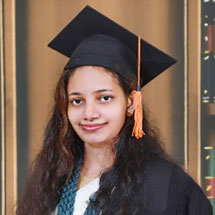
Sahani Sandeepa Millavithanachchi
I am writing to share my testimonial for my MSc in Agriculture Microbiology at the University of Colombo, Sri Lanka. Throughout the program, I gained valuable experience and knowledge about microorganisms and related subjects and I have gained a wealth of useful information and practical skills related to microorganisms and their applications in agriculture.
The program’s comprehensive curriculum has equipped me with a strong foundation in agricultural microbiology. One of the highlights was the opportunity to go on several field trips, which provided practical exposure and allowed me to see the application of microbiology in real agricultural environments. During my MSc, I deepened my understanding of microorganisms and their role in agriculture. These experiences have enhanced my ability to connect theoretical concepts with practical scenarios.
And it is my privilege to acknowledge the presence of numerous esteemed academics who served as lecturers in the MSc in Agriculture Microbiology program. Their expertise and dedication have been invaluable to the learning experience and have significantly enriched the program. And I must emphasize that all of these lecturers have been exceptionally friendly and approachable throughout the MSc in Agriculture Microbiology program. Their warm and welcoming demeanor has created a supportive and inclusive learning environment.
The MSc in Agriculture Microbiology has been a transformative experience that has bolstered my career and enabled me to make a meaningful impact in the academic community. I highly recommend the MSc in Agriculture Microbiology program at the University of Colombo.
S. S. Millavithanachchi, Assistant Lecturer (Temporary), Faculty of Technology, Sabaragamuwa University of Sri Lanka.

Adheesha Bandara
I would proudly say that choosing this MSc programme is one of the wisest decisions which I have made to enlighten my academic pathway. After completing my BSc degree in Botany stream, I started my career as a Microbiologist at a well-known private company.
As I was always interested in Microbiology field and also for the betterment in my career pathway, I chose to follow this MSc program. Of course, I gained a lot of valuable knowledge and hands on experience in Microbiology throughout this program.
The faculty members are really dedicated, highly qualified in their respective fields and also super helpful to the students. This program is a great opportunity for both higher education- aimed students and career – aimed students. It includes course units which complies with current requirements such as Bioinformatics, Biostatistics, Entrepreneurship and many more along with field visits to the relevant industries. So, I would highly recommend this Msc in Agricultural Microbiology program as an excellent choice for future candidates who are enthusiastic to broaden their knowledge in Microbiology.
Adheesha Bandara, Research and Development Scientist at Link Natural Products (pvt) Ltd.
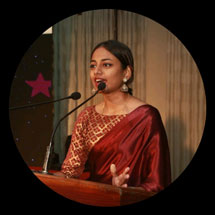
Yasara Gunawardena
The MSc. in Agricultural Microbiology conducted by Department of Plant Sciences is a dynamic, industry-focused, interdisciplinary and well structured program. The modules cover variety of topics including food , soil microbiology, bioinformatics, organic agriculture, entrepreneurship, plant quarantine to note a few.
The lecturers are super supportive, flexible and highly skilled in their respective areas of expertise ensuring lecture delivery is interactive and application based.
The curriculum consists of field visits to industry pioneers, providing a hands on experience.
Course program is suitable for recent graduates and professionals alike, who are pursuing a career in agricultural microbiology/related industries or simply interested to learn more!
Yasara Gunawardena (current student), Product Manager, John Morris Group
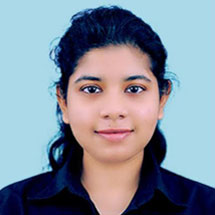
Jithni Shavindini
The MSc program in Agricultural Microbiology, offered by the Department of Plant Sciences at the University of Colombo, provides an enriching learning experience for students interested in this field. The lectures are conducted with great expertise, delivering comprehensive knowledge and insights into the diverse aspects of agricultural microbiology.
The well structured practical sessions not only provide valuable laboratory skills but also enable students to gain firsthand experience in various microbiological techniques.
Furthermore, the Department of Plant Sciences at the University of Colombo consists of a team of experienced and dedicated faculty members who are well-versed in their respective fields. Their expertise and guidance contribute significantly to the overall
quality of the program.
This learning experience fostered me a supportive learning environment that allowed me to ask questions, seek clarification, and actively participate in discussions. I highly recommend this MSc course for anyone seeking a fulfilling learning experience.
Objectives
The main objective is to disseminate new knowledge, technologies and advances in agricultural microbiology to current and prospective agriculturists. In addition the programme intends to:
- provide a sound background in microbial processes and their applications in agriculture.
- train in culturing and preservation of microorganisms
- simulate microbial processes in the laboratory
- train in laboratory management
- encourage and lay a framework to establish organic farming systems in Sri Lanka.
- train in applying proper scientific methods and hypothesis testing to design and execute experiments necessary for innovation and problem solving.
- produce experts capable of using novel technologies in current agricultural settings to overcome challenges and enhance productivity.
For whom
- Graduates who are expecting to pursue M. Phil/Ph.D. studies in a related field.
- Research officers/scientists, extension officers, and educators in public and private institutions who require advanced training in agricultural microbiology.
- Qualified entrepreneurs and enthusiast with an interest in the field of microbiology and agriculture.
Eligibility
Important Dates
Apply before – 1st April 2025
Programme commencement – July 2025
Course Fees
- MSc in Agricultural Microbiology (Parts I and II of the programme)
Fees – LKR 400,000/- (should be paid in full at the time of initial registration)
- MSc (Research) in Agricultural Microbiology
Only the students who successfully complete Parts I and II will be eligible to proceed to Part III (research project) leading to the MSc (Res.) degree programme. Students who wish to proceed to Part III should make an additional payment of Rs. 150,000/- (subject to change) at the time of enrolment for Part III
Application Fee: Rs. 2,500/-
*Please note that fees paid are not refundable and subject to revision from time to time.
How to apply
Make sure you have scanned copies of the following documents before applying
- Copy of the bank slip (application fee of Rs. 2500/-)
- Scanned copies of relevant educational certificates
- Passport size photograph
Application fee: Rs. 2500/=
Payment details:
- Bank: People’s Bank
- Branch: Thimbirigasyaya.
- Name of account: University of Colombo.
- Account No: 314013000000
Course Duration
- The duration of Parts I and II of the Master of Science programme is 24 months. The duration of Part III is of a further 12 months.
- The maximum period allowed to complete the degree is five (05) years from the date of first registration.
- Students who fail to complete Part I and Part II within 3 years from the first registration will not be allowed to register for Part III.
Lectures and practicals will be conducted on Fridays (online from 6.30 –8.30 pm) and Saturdays (onsite from 8 am to 5 pm). Lectures will be conducted in a blended mode with both online and face-to-face sessions. Practical sessions will include both laboratory work and field visits.
Medium of Instruction
The medium of instruction as well as that of assessments/examinations shall be English, and the medium for correspondence shall also be English.
Course Modules
PART I - Postgraduate Diploma (SLQF L8) Total credits - 25
Semester I
| Course Code | Name | Credits |
|---|---|---|
| MAM 5101 | General Microbiology | 15L, 1C |
| MAM 5102 | Separation and Characterization Techniques | 15L, 1C |
| MAM 5103 | Agricultural Biotechnology | 30L, 2C |
| MAM 5104 | Biostatistics, Experimental Design | 10L, 10P, 1C |
| MAM 5108 | Microbial Bioinformatics | 30P, 1C |
| MAM 5105 | Laboratory Techniques Course | 15L, 1C |
| MAM 5106 | Practical Module I | 120P, 4C |
| MAM 5107 | Seminar | 30P, 1C |
Semester II
| Course Code | Name | Credits |
|---|---|---|
| MAM 5206 | Post-harvest Diseases | 15L, 1C |
| MAM 5209 | Food Microbiology | 15L, 1C |
| MAM 5201 | Soil Microbiology | 15L, 1C |
| MAM 5207 | Plant Disease Management | 15L, 1C |
| MAM 5204 | Organic Agriculture | 15L, 1C |
| MAM 5208 | Quality Assurance and Laboratory Management in Microbiology | 30L, 2C |
| MAM 5212 | Plant inspection and quarantine | 15L, 1C |
| MAM 5213 | Entrepreneurship | 15L, 1C |
| MAM 5211 | Practical Module II | 120P, 4C |
PART II - Total Credits - 05
Semester III
| Course Code | Name | Credits |
|---|---|---|
| MAM 5301 | Directed Study (guided mini research project/case study) | 150P, 5C |
- Part I + Part II : Master of Science (SLQF L9) – Total credits – 30
PART III - Total credits - 30
Semester IV
| Course Code | Name | Credits |
|---|---|---|
| MAM 5401 | Research Project | 12 months, 30C |
- Part I + Part II + Part III : Master of Science (Research) (SLQF L10) – Total credits – 60
Intended Learning Outcomes
At the end of the programme students should be able to,
- demonstrate critical awareness of fundamental concepts, theories, processes, applications and current issues/trends in the field of agricultural microbiology.
- identify and explain the diverse and vital roles of microorganisms in agriculture-based industries.
- demonstrate skills in the use of tools, technologies and methods common to microbiology and associated industries.
- apply proper scientific methods and hypothesis testing to design and conduct investigations and make accurate interpretations and conclusions.
- communicate and disseminate findings and decisions to the specialist in the field and wider community.
- evaluate, plan and execute appropriate microbe-based solutions in a methodical and creative way to deal with issues and challenges in agriculture related industries.
- demonstrate self-direction and originality in tackling and solving problems related to the field
- uphold relevant ethical standards and professional conduct at all times.
Program Structure
The MSc in in Agricultural Microbiology programme consists of theory modules, practical classes, field lessons, a case study/mini research project (a guided independent study) and a research project. Theory modules will be conducted in a blended mode with both online and face-to-face lectures and tutorial classes. In a theory module, fifteen direct teaching hours (50 notional hours) is considered as one credit and in the practical and field courses, thirty hours of work/direct teaching (50 notional hours) is considered as one credit. The programme structure is designed according to the Master of Science By-Laws No. 8 of 2021 of Faculty of Science/University of Colombo and the guidelines issued by the Quality Assurance and Accreditation Council of the UGC, SL to fulfill the criteria of MSc programs, SLQF L 8, 9 & 10. MSc in Agricultural Microbiology programme consists of 3 parts.
Part I:
- Consist of theory modules, field lessons, and laboratory sessions that amount to 25 credits. This is equivalent to Level 8 of the SLQF (Sri Lanka Qualifications Framework)
- Students who obtain a GPA of 2.70 or above for Part I may be eligible for the award of the Postgraduate Diploma in Agricultural Microbiology (SLQF L8), upon request, provided the student fulfills other requirements as prescribed by these By-Laws and Rules and Regulations of the University of Colombo.
- Successful completion of Part I with a GPA of 3.00 is required to proceed to Part II.
Part II:
- Part II consists of a directed study equivalent to a guided mini research project/case study worth 5 credits. Students undertaking the mini research project/case study are required to carry out research at an academic/research/industrial institution where necessary facilities are available and submit a report on the research/case study carried out.
- Part I (25 credits) and part II (5 credits) combined (30 credits in total) is equivalent to level 9 of the SLQF.
- A student who obtains a GPA of 3.00 or above for Part II may be eligible for the award of the Degree of Master of Science in Agricultural Microbiology, upon request, provided the student fulfills other requirements as prescribed by these By-Laws and Rules and Regulations of the University of Colombo.
- To proceed to Part III students should achieve a GPA of 3.00 for Part II and complete parts I and II within three years from the date of registration
Part III:
- Consist of an individual research project of 30 credits. Students undertaking a research project are required to carry out research at an academic/research/industrial institution where necessary facilities are available and submit a dissertation on the research carried out. The title of the research project, place where the research work shall be carried out, and the supervisor/s should be recommended and approved by the relevant authorities as stipulated by the Master of Science By-Laws No. 8 of 2021, prior to commencement of research.
- Part I (25 credits), part II (5 credits) and Part III (30 credits) combined (60 credits in total) is equivalent to level 10 of the SLQF.
- Students who obtain a GPA of 3.00 or above for Part III of the programme may be eligible for the award of the Degree of Master of Science in Agricultural Microbiology (Research), provided the students fulfill other requirements as prescribed by the By-Laws and Rules and Regulations of the University of Colombo.
- A student who fails to achieve a GPA of 3.00 or above for Part III shall be eligible to be awarded the Degree of Master of Science in Agricultural Microbiology, upon request, provided the student fulfills other requirements as prescribed by these By-Laws and Rules and Regulations of the University of Colombo.
Course Evaluation
- All the theory course modules will be evaluated by written examinations and/or assignments.
- Practical modules will be evaluated by separate practical assessments and/or assignments and/or continuous assessments.
- Seminars shall be evaluated by presentations.
- Directed study (mini research project/case study) will be evaluated through a written report, a presentation and a viva-voce examination.
- The research project will be evaluated through a written research proposal, dissertation, a presentation, a viva-voce examination and a manuscript.
Further Information
Further information regarding the MSc Program can be obtained by contacting the programme coordinator.
Contact details of the programme coordinators are as follows.
| Intake | Coordinator | Mobile | Phone(office) | |
| 2025 | Dr. Surani Ediriweera | surani@pts.cmb.ac.lk | +94 77 3157639 | +94 11 2585038 |
| 2024 | Dr. Sameera Ariyawansa | sameera@pts.cmb.ac.lk | +94 77 3658528 | +94 11 2585038 |
| 2023 | Dr. Sameera Ariyawansa | sameera@pts.cmb.ac.lk | +94 77 3658528 | +94 11 2585038 |
